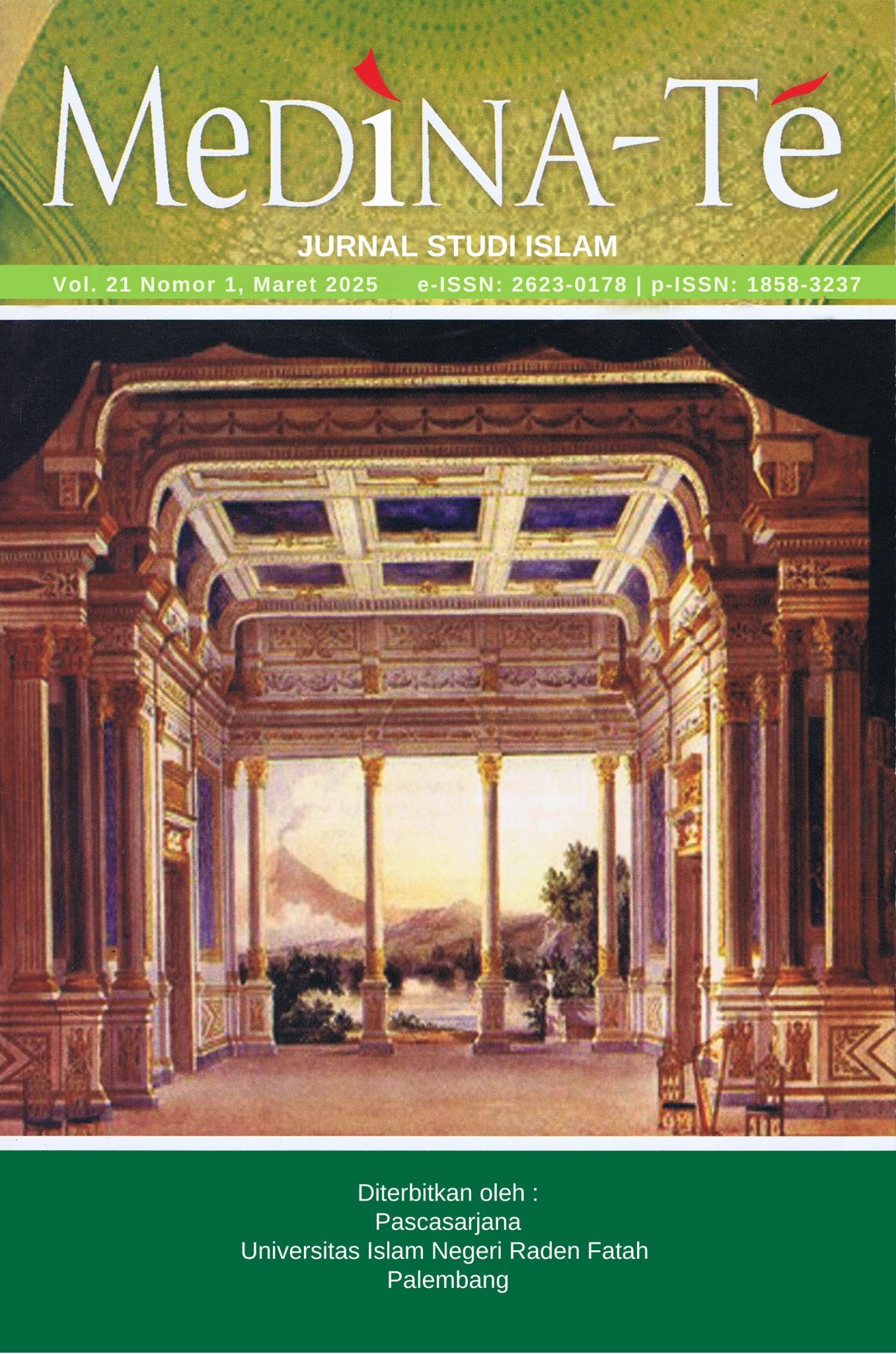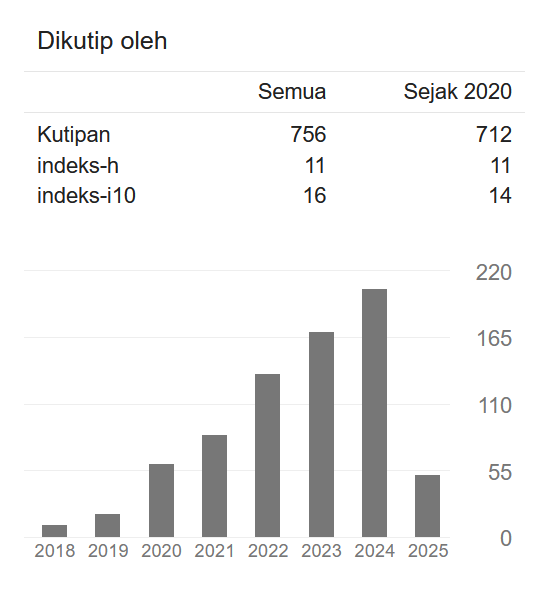Unravelling the Linguistic Veil: Leadership and the Position of Women from Al-Sya'rawi's Perspective
DOI:
https://doi.org/10.19109/medinate.v21i1.26186Keywords:
Al-Sya’rawi, Leadership, WomanAbstract
The Position of Women in Leadership in Indonesia still faces various social and cultural challenges. Although the constitution guarantees women's right to lead, traditional social norms and gender stereotypes often become obstacles. This study aims to analyze Muhammad Mutawalli Al-Sya'rawi's views on leadership and the status of women in Islam through a linguistic approach. Al-Sya'rawi, an Egyptian exegete, is renowned for his linguistic-semantic method of interpretation, which offers a new perspective in understanding Qur'anic verses. This study uses a qualitative method to explore Al-Sya'rawi's perspectives on leadership and the role of women by analyzing his writings and understanding the cultural and social backgrounds that influenced his thought. An interpretative, descriptive, and content analysis approach is employed to examine Al-Sya'rawi’s interpretation of verses related to leadership and the status of women, particularly in Surah al-Nisā’ [4]: 34. The analysis shows that Islam provides equal opportunities for both men and women in the public sphere, while also emphasizing women's roles in the domestic sphere as wives and mothers, with rights and responsibilities equal to those of men. According to Al-Sya‘rawi, although women can participate in the public domain, leadership in general is still considered more suitable for men, given the significant responsibilities that leadership entails.
References
Al-Ghazali. (2008). Mutiara Ihya Ulumuddin (I. Kurniawan (ed.)). PT. Mizan Pustaka.
Al-Sya’rawi, M. M. (1991). Tafsīr Khawāṭir al-Sya‘rāwī, Juz 4. Akhbar Al-Yaum.
Aryal, N. P., & others. (2023). Factors Affecting Women’s Entrepreneurial Leadership Roles: Evidence from Kathmandu, Nepal. International Journal of Management Studies and Research. https://doi.org/10.9734/ijmsr/2023/v11i22180
Ayizi, M. A. (1337). Mufassirun Hayatuhum wa Manhajuhum. Mu’assasah at-Taba’ah wa an-Nasyr.
Badruzzaman, M. Y. (2009). Tafsir al-Sya‟rawi: Tinjauan Terhadap Sumber, Metode, dan Ittijah.
Chen, C. (2024). Women in Management: Leadership Styles, Diversity Issues, and Global Effectiveness. Frontiers in Psychology. https://doi.org/10.3389/fpsyg.2024.1001247
Corpora, U. I. (2023). Indonesia Women Leaders Forum 2023 Pengaruh Kepemimpinan Perempuan Di Kancah Nasional Dan Internasional.
Eranutrisi, D., & others. (2024). Peran Perempuan dalam Kepemimpinan Lembaga Keagamaan: Perspektif Gender dan Budaya. Jurnal Kepemimpinan Islam Nusantara.
Faridah, F., Ni’mah, S., Yusuf, M., & Kusnadi, K. (2022). Kepemimpinan Perempuan dalam Tinjauan Hadis. Jurnal Al-Mubarak: Jurnal Kajian Al-Qur’an Dan Tafsir, 7(1), 10–22. https://doi.org/10.47435/al-mubarak.v7i1.1054
Fatimah, S. (2015). Kepemimpinan Perempuan dalam Prespektif Al-Qur’an.
Fauzi, M. (1990). al-Syeikh al-Sya‟rawi: Baina al-Islam wa al-Siyasah.
Fauziah, D. N. (2021). Metodologi Tafsir Asy-Syaâ€TM râ wî. Al-Tadabbur: Jurnal Ilmu Al-Qur’an Dan Tafsir, 6(02), 231–252.
Gharib, M. (1987). al-Imam al-Sya‘rawi wa Haqaiq al-Islam. Maktab al-Gharin.
Kusuma, H. (2010). Penafsiran At-Tabari dan Asy-sya’rawi Tentang Makanan. https://digilib.uin-suka.ac.id/id/eprint/3904/
Lambert, E. H., & others. (2023). Empowering Women in Leadership Roles: A Study in Sidama Region. Global Journal of Management and Business Research. https://journalofbusiness.org/index.php/GJMBR/article/view/3787
Lutfiyah, L., & Diyanah, L. (2022). Kepemimpinan Perempuan Dalam Al-Qur’an Kajian Tafsir Tematik. Al Furqan: Jurnal Ilmu Al Quran Dan Tafsir, 5(2), 270–287. https://doi.org/10.58518/alfurqon.v5i2.1399
Mahdi, I. (2024). Exual Equality Dalam Perspektif Al-Qur’an: Solusi Terhadap Dominasi Seksual. Institut PTIQ Jakarta.
Octavianus, W. (2020). Strategi Optimalisasi Kinerja Kepemimpinan Gereja Lokal. Integritas: Jurnal Teologi, 2(1), 77–94.
Prieto-Rios, S., & Lopez-Figueroa, J. (2019). The Impact of Female Political Leadership on Public Policies and Empowerment. Journal of Gender Studies. https://doi.org/10.1080/09589236.2019.1574312
Rahim, A. (2016). Peran Kepemimpinan Perempuan dalam Perspektif Gender. Al-Maiyyah: Media Transformasi Gender Dalam Paradigma Sosial Keagamaan, 9(2), 268–295. https://ejurnal.iainpare.ac.id/index.php/almaiyyah/article/view/352
Subhan, Z. (2015). Al-Qur’an dan perempuan. Prenada Media.
UGM, P. S. W. (2017). Kepemimpinan Perempuan di Indonesia. Pusat Studi Wanita Universitas Gadjah Mada.
Wahjosumidjo. (2016). Organisasi, Kepemimpinan & Prilaku Administrasi. Gunung Agung.
Widiastuti, T., & others. (2024). Wayang Golek and Female Leadership: A Gadamerian Hermeneutics Approach to Gender Studies. Asian Journal of Research in Arts & Social Sciences. https://doi.org/10.9734/ajhss/2024/v18i230026








